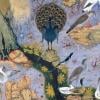
The Resonance Collective is presenting its fifth annual N.E.O. (New Explorative Oratorio) Voice Festival June 22–29. Educating musicians interested in holistic vocal performance and writing for the voice, the festival, begun in 2019, attracts a diverse international community of performers and composers.
Taking place at First Congregational Church of Los Angeles, the weeklong celebration features a series of concerts and workshops that culminate in the annual “Exploratorio” performance, a large-scale work composed and performed by festival participants and faculty. From the prompt “Uncanny: An Open Letter to AI,” this year’s world-premiere oratorio will reexamine facets of traditionally sacred themes.

The festival is led by a trio of vocal experts: composer and conductor David Harris, who specializes in new music, American music, and the intricacies of communication in singing; soprano Laurel Irene, a vocal artist and researcher with a knack for bringing new compositions to life; and Fahad Siadat, artistic director of the Resonance Collective, whose organization explores and expands the definition of sacred music. Abraham Ross serves as the festival’s organist.
The festivities include three performances open to the public: “Out of the (Voice) Box,” a chamber voice concert on June 22 featuring performances by festival scholars and fellows; “Resonant Geometries,” a participatory sound installation on June 26 facilitated by N.E.O. guest artist Carmina Escobar; and the above-mentioned oratorio performance on June 29.
Siadat, who founded the Resonance Collective in 2012 and who will be performing in “Out of the (Voice) Box,” as well as contributing a new composition to that program, explained the genesis of the festival. “Singers interested in vocology [the science and practice of vocal training] wanted to bring more of that into the singing sphere. David, Laurel, and I started to build a curriculum together that we revised every year based on new research, new understandings, [and] new ideas that we thought would be most helpful to people to open those new doors.
“The opportunity of the N.E.O. Festival is for its participants to reexamine [their artistic assumptions] and rebuild their own sets of principles as individual artists,” continued Siadat. “Some of that we do through practical means — looking at the voice as an acoustic instrument and [at] what’s possible with this extremely versatile instrument — giving people a week to explore that as performers, creators, improvisors.
“One of the unique opportunities [of the festival],” added Siadat, who is also artistic director (and a singing member) of L.A. new-music vocal ensemble HEX, “is that it’s not genre-based. Most music festivals are oriented around classical music, and while it’s true that many [singers] who come to this are based in classical training, they also have backgrounds in pop, jazz, electronic music, and improvisation. We welcome all of those influences into the festival.”

Siadat said that there are usually 35–40 participants each year, and they hail from around the world, including Korea, Australia, Croatia, the Dominican Republic, Mexico, and from all over the United States. “[Each day is] full of events, with morning and afternoon sessions, rehearsals, then concerts. The $900 tuition fee is extremely cheap, [and] half or more of the participants get some [sort of] scholarship. And we have a fellowship program where we invite some people to come tuition-free.”
To that end, Siadat explained that the festival’s co-directors work with local colleges and universities and “ask professors to recommend students who would benefit [from N.E.O.] but might not have access. We offer them full scholarships, and we get four to six collegiate scholar participants every year. It’s an open-minded community of people ready to explore.”
Indeed, when participants apply, they can be considered as featured soloists, composers, or choristers (or some combination). Siadat said that those selected as composers write a piece for the oratorio. “They start writing that music the month before the festival begins, [and] we have a remote workshop process for these pieces. When they show up for the festival is when they rehearse.”

Each year the organizers choose a different theme for N.E.O., and Siadat recalled that the first years explored the “origins of creativity. We leaned into that idea of where this comes from, who we are. We got everything from sacred hymns to an experimental piece [that had the performers] running around with balloons and popping them. This year it’s an opportunity for people to explore relationships, fears, hopes, and dreams that they have with this emerging AI technology.”
As for the venue, First Church, whose sanctuary seats 800, both Siadat and Harris work there. “David [has been] music director for the past seven years, and I’m the assistant director,” Siadat explained. “The collaboration largely started once David and I started working there. He and I are career-long new-music advocates. We have brought a lot of our own projects to the church, and from there, a number of other organizations started bringing their work to the space as well.”
Siadat added that the audience for the festival is mostly “new-music people who have not seen this kind of contemporary composition in choral music before. Choral music loves living composers, and yet, there’s a disconnect between what happens in the new-music world and the choral world [regarding] aesthetics, compositional techniques, philosophical ideas. The N.E.O. Festival is an opportunity to try to bridge that gap.”




